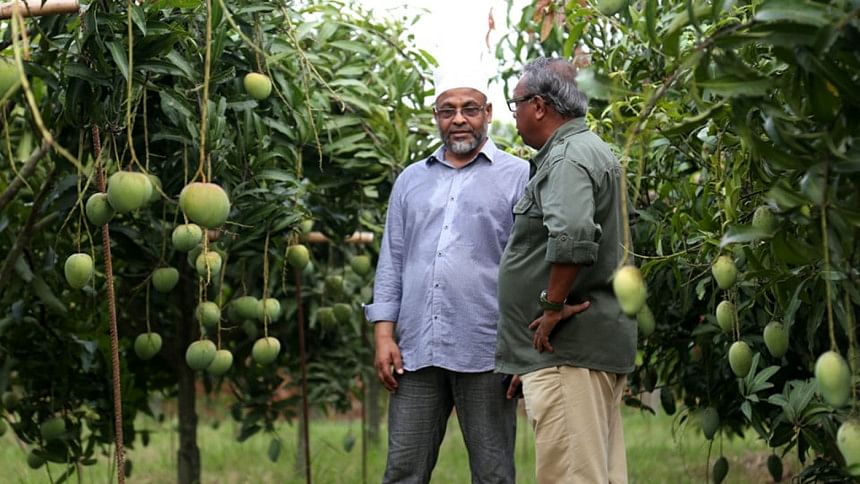Mango export: Death of a dream?

Can you find people in our country who have not fallen in love with the sweetness and smell of mango? A juicy mango can make you forget all the fatigue. Such as Alexander the Great forgot. In his mission to conquer the world, he came to India and enjoyed mango like anything. On his way back, Alexander took some mangoes in a basket to distant Greece. But the history of the world says the history of mango is even older. Mango is one of the special fruits of this subcontinent. I was reading a research paper on history of mango written by History Professor Dr Indu Mehta from Kumaun University where he mentioned the thousands of years of its history. However, when the Chinese tourist Hiuen Tsang visited India in 632 to 645 AD, he became acquainted with the mango fruit of the region. At that time he introduced mango to the world as a fruit. I mentioned the story of Mughal Emperor Akbar about mango in an earlier article. During his reign he planted about 100 thousand mango trees in Darbhanga area of Lakhbagh, India, which is said to be the largest mango orchard in the Indian subcontinent.
Then the Portuguese came and enjoyed the mango. They spread mango all over the world. Wherever they built a colony, they took mango and made mango orchards. Mango reached Mexico by 1800, and Florida in the United States in 1833. Mangoes from there spread all over the world. At present mango is grown in more than 90 countries. The people of the world are fascinated by mango. Mango is one of the popular fruits. The mango market is worth millions of dollars in the world. A few days ago, it was predicted that the global mango market in 2029 will be around 1800 billion US dollars.
Bangladesh ranks eighth among the top 10 mango producing countries. But Bangladesh is not among the top 20 mango exporting countries, though mango production is increasing every year. Mango farmers are producing mangoes every year with interest to capture a big market. But why can't we enter the global market with all the vegetables, fruits and mangoes? Before looking for the answer to this question, readers, I would like to inform you that even a decade ago, every fruit shop in this country was full of Indian mangoes.
In Bangladesh, good varieties of mangoes mainly grow in Rajshahi and Chapainawabganj. Moreover, the mango trees at people's courtyard all over the country are of common varieties. People used to believe that good variety of mango is not possible in other soil except Rajshahi and Chapainawabganj. There was such a belief even among the experts. But the curious farmers of this country have taken the issue of fruit production as profitable with the expansion of commercial agriculture.
Mango, the king of fruits, has spread all over the country through the hands of entrepreneurial farmers. In addition to the traditional famous varieties, more new varieties have come. Mango orchards have spread everywhere day by day. With the expansion of mango production in Bangladesh, agro-industrial enterprises started multi-faceted commercialization of mango. I remember people of the north were once in trouble with Ashwina mango. They were not getting paid. For the first time in the country, Amjad Khan Chowdhury, founder of Pran Group, took the initiative to make industrial products from mango.
About 15 years ago, I presented to you on Hridoye Mati O Manush how local varieties of sour mango and Ashwina mango are added to the commercial trend in different northern districts including Natore. The mangoes that used to fall from the trees have also become cash crops for the farmers. Mango now not only fascinates us with its sweetness and taste, but also in trade.
The rate of increase in fruit production in our country has added a dimension to the agricultural economy, there is also a large contribution to the export potential. Mango of our country has been going to the local markets, called ethnic markets, of different countries of the world for several years now. Mangoes are being sold there among Bangladeshi expatriates. But I did not find Bangladeshi agricultural products in the wholesale markets of England or America.
For the first time, Bangladeshi mangoes were available in a major UK supermarket in 2015. With the efforts of farmers of several mango producing districts, like Satkhira, Chapainawabganj and Rajshahi this was made possible.
Supported by the Department of Agriculture Extension (DAE) they worked to improve their quality to ensure no pest, disease or chemical contamination.
FAO's technical assistance played a key role in the process and also with cordial assistance from the then FAO representative Mike Robson. On a trial basis, 500 boxes of best quality mangoes (weighing 626kg) from Satkhira were shipped to ASDA (a Walmart subsidiary), one of the largest retail chains in the UK, on May 17, 2015. This success story began with FAO's Dutch funded Food Safety Programme which worked to highlight the connection between production and handling practices, product safety and quality. Solidaridad Network Asia, supported by the Dutch Embassy has been also playing their role in GAP (Good Agricultural Practices) ensured contract mango production. They have also developed a business model for an inclusive supply chain for production of safe mango and market promotion at the domestic and international level through a multi-stakeholder initiative.
Various consultation meetings were held with the mango farmers of Chapainawabganj, Rajshahi, organized by 'Hridoye Mati O Manush's 'Krishi Budget Krishoker Budget,' an open field farmer-policymaker consultation programme. At that event, the farmers raised the issue of mango 'fruit fly'.
According to DAE, 788 tonnes of mangoes were exported in 2014-15, but it drastically dropped to 288 tonnes in the 2015-16 fiscal year. There are several reasons behind this low tide in mango export trade. The biggest reason is our negligence. I spoke to some of those who took part in the first mango export at Walmart. They say how a possibility is wasted in the bud.
The first blow came because of the dishonesty of some people between farmers and exporters. Farmers said that the quality of the mangoes they gave was mixed with the mangoes bought from outside and the quality was ruined. As you already know GAP (Good Agricultural Practice) wasn't properly maintained in some cases.
If you want to send agricultural goods to any country in the European Union, you have to abide by the EU's compliance in production and packaging. Due to lack of will of those, who were involved in these export activities, the issue of obtaining the GAP certificate has not been settled so far. Jamil Ahmed from London had a contract with Walmart.
He had booked a place for 700 tonnes of mangoes at Walmart a year ago. Walmart also left the place vacant as per the agreement and registered Dwip International of Bangladesh as an exporter. And they also started sending mangoes as per the conditions. After sending four to five tonnes of mangoes, Dwip International failed to send mangoes to Walmart. To know the reason, I talked to Paritosh Chandradas Manik Babu, owner of Dwip International.
He said the quarantine department of the government's agricultural exports had stopped exporting agricultural products, citing sudden fruit flies in vegetables. As a result, it was no longer possible for him to send mangoes to Walmart.
The FAO representative wrote in the letter that mango production has been done with compliance standards. Walmart agreed to buy mangoes for that year, but also said it would require a GAP certificate next year. But the biggest problem was the sudden closure of the export opportunity by the contracted company Dwip International. As a result, Jamil Ahmed suffered extreme losses. Besides, a big opportunity for mango export from Bangladesh was wasted.
At that time Saleh Ahmed was working as a consultant at Hortex Foundation. He said he had tried for GAP certification, but could not coordinate with other departments in a single effort. I spoke to Mansurul Hannan, the present Managing Director of Hortex Foundation about the current situation of mango exports.
The question was, why we could not bring agricultural products under a certification in five years? His words also showed that it is difficult to coordinate at the field level. I also talked with Agriculture Minister Dr Abdur Razzaque. He simply stated that he did not know about the matter. No one informed him. He has taken the initiative after learning recently. Hopefully the complexity of this GAP certification will be resolved. At an event of agriculture ministry last year, the Japanese ambassador expressed interest in importing mangoes from Bangladesh.
However, the Ambassador of Japan Naoki Ito stipulated that the mangoes have to be free of fruit flies. I also wanted to know from the agriculture minister how far that process has progressed. He also assured me that the process is going on. Our agricultural products have been neglected in the international market for a long time. Our sincerity for export has also waned at one point. I have been looking for our agricultural products in various wholesale markets in England and Europe for the last one decade. But I have been disappointed again and again. Products come from a small country of Africa but we can't get in there with our products.

I visited Birmingham's largest wholesale market in England and learned that DEFRA, an agricultural and food safety provider in the country, has enough sincerity about our country's agricultural products, but we have repeatedly failed to meet the terms.
The same thing has happened again and again in the case of lemon and drinks. The last time I visited a wholesale market in central England was in October 2016, and I found a more disappointing picture. I saw that the drink of our country reached there, but it was in the identity of our neighboring country. In the case of mango, the same frustration engulfed us. In the last one decade we have achieved great success in fruit production.
Since the beginning of mango export in 2014-15, we have reached the eighth place in the world in mango export. But then it stopped. The Corona situation has brought a lot of uncertainty to the world. Even in this situation, we see the light of hope from our rich diversified agricultural sector. We have to take multi-faceted initiatives. We need to be proactive in meeting the needs of import-dependent countries. Here we have to show the highest diplomatic and commercial activity. Export market must be created. All government agencies have to work with utmost sincerity to address the issues of exporting agricultural products. Finally, I do hope that the government will take all necessary steps to reopen the doors of export trade of all seasonal fruits including mango.

 For all latest news, follow The Daily Star's Google News channel.
For all latest news, follow The Daily Star's Google News channel. 



Comments